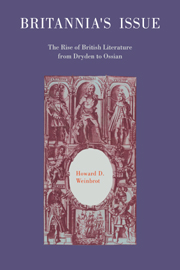Book contents
- Frontmatter
- Contents
- Acknowledgments and editorial notes
- INTRODUCTION: An overview of scope and method
- PART I CONTEXTS: INTELLECTUAL, PSYCHOLOGICAL, AND NATIONAL
- PART II TEXTS WITHIN CONTEXTS. ESSAYING ENGLAND: OUR GENIUS, OUR CLIME
- PART III GROWING ONE'S OWN. THE BRITISH ODE FROM COWLEY TO GRAY
- Prologue to Part III
- 9 GREEK JOCKEYS AND BRITISH HEROES: THE RISE AND FALL OF THE PINDARIC ODE
- 10 ODES TO THE NATION AND THE NORTH: DRYDEN, COLLINS, AND GRAY
- PART IV EXPANDING THE BORDERS. JEWS AND JESUS: THIS ISRAEL, THIS ENGLAND
- PART V CELTS, GERMANS, AND SCOTS: TOWARDS A UNITED KINGDOM
- APPENDIX: The text of Handel's “Israel in Egypt”
- Index
9 - GREEK JOCKEYS AND BRITISH HEROES: THE RISE AND FALL OF THE PINDARIC ODE
Published online by Cambridge University Press: 15 December 2009
- Frontmatter
- Contents
- Acknowledgments and editorial notes
- INTRODUCTION: An overview of scope and method
- PART I CONTEXTS: INTELLECTUAL, PSYCHOLOGICAL, AND NATIONAL
- PART II TEXTS WITHIN CONTEXTS. ESSAYING ENGLAND: OUR GENIUS, OUR CLIME
- PART III GROWING ONE'S OWN. THE BRITISH ODE FROM COWLEY TO GRAY
- Prologue to Part III
- 9 GREEK JOCKEYS AND BRITISH HEROES: THE RISE AND FALL OF THE PINDARIC ODE
- 10 ODES TO THE NATION AND THE NORTH: DRYDEN, COLLINS, AND GRAY
- PART IV EXPANDING THE BORDERS. JEWS AND JESUS: THIS ISRAEL, THIS ENGLAND
- PART V CELTS, GERMANS, AND SCOTS: TOWARDS A UNITED KINGDOM
- APPENDIX: The text of Handel's “Israel in Egypt”
- Index
Summary
The ode is another major Greco-Roman genre popular through much of the Restoration and eighteenth century. Indeed, its presence has been used both to weaken and to support the shaky walls of presumed neoclassicism. As with other genres, however, modern British writers would absorb and transform appropriate conventions and reject others. During some 150 years of experiment, poets invent, vary, exhaust, and redefine the form that becomes so British that even Greek relicts take the native hue.
Greek Alternatives And Greek Vices
Since too little of Alcaeus' poems remained, there were three Greek, and one Roman, models essential for later writers of lyric poetry. The sixth-century BC Anacreon was primarily the poet of wine, women (or men) and song. Though amiable in his charm, music, simplicity, and “softness,” he was censured for his fidelity to the grape and infidelity to the lover. History complimented the seventh-century BC Sappho with fantasy courtships from both Alcaeus and Anacreon. She shared the latter's sexually generous tastes – for Megara, a “dishonest and unnatural Pleasure,” Basil Kennet says, and for Phaon, the rejecting, handsome young man whom she no doubt seriously punished by drowning herself. Sappho's poetic remains were honored, but like Anacreon's were tainted by sensuality. “A wanton Sappho, or Anacreon, among the Ancients,” we hear in 1699, “never had the same applause as a Pindar or Alcaeus; nor in the judgment of Horace, did they deserve it.” Those who preferred lyrics beyond the bedroom or barroom also preferred Pindar, whose sublime songs of Greek Olympic heroes energized, inspired, and puzzled much of literate seventeenth- and eighteenth-century Atlantic culture.
That culture was in broad agreement regarding many of Pindar's characteristic traits.
- Type
- Chapter
- Information
- Britannia's IssueThe Rise of British Literature from Dryden to Ossian, pp. 334 - 358Publisher: Cambridge University PressPrint publication year: 1993



